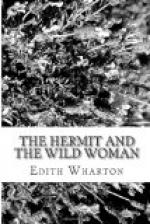At first, during his night vigils, he had felt a great fear of the stars, which seemed to set a cruel watch upon him, as though they spied out the frailty of his heart and took the measure of his littleness. But one day a wandering clerk, to whom he chanced to give a night’s shelter, explained to him that, in the opinion of the most learned doctors of theology, the stars were inhabited by the spirits of the blessed, and this thought brought great consolation to the Hermit. Even on winter nights, when the eagle’s wings clanged among the peaks, and he heard the long howl of wolves about the sheep-cotes in the valley, he no longer felt any fear, but thought of those sounds as representing the evil voices of the world, and hugged himself in the solitude of his cave. Sometimes, to keep himself awake, he composed lauds in honour of Christ and the saints, and they seemed to him so pleasant that he feared to forget them, so after much debate with himself he decided to ask a friendly priest from the valley, who sometimes visited him, to write down the lauds; and the priest wrote them down on comely sheepskin, which the Hermit dried and prepared with his own hands. When the Hermit saw them written down they appeared to him so beautiful that he feared to commit the sin of vanity if he looked at them too often, so he hid them between two smooth stones in his cave, and vowed that he would take them out only once in the year, at Easter, when our Lord has risen and it is meet that Christians should rejoice. And this vow he faithfully kept; but, alas, when Easter drew near, he found he was looking forward to the blessed festival less because of our Lord’s rising than because he should then be able to read his pleasant lauds written on fair sheepskin; and thereupon he took a vow that he would not look upon the lauds till he lay dying.
So the Hermit, for many years, lived to the glory of God and in great peace of mind.




